
| |
A written and audio history of the campus radio stations at Wake Forest College and Wake Forest University | |
Dr. Julian C. Burroughs ('51)No one was more astonished than Dr. Julian Burroughs at the enthusiasm of the gathered WFDD alumni who took a sentimental journey through the campus station's history on October 25, 2003, in Winston-Salem. "I was surprised and heart-warmed at the spirit of the occasion and the fact that people spanning three decades came," says the former Speech Communications professor.
"Julian Burroughs is here!" "Dr. Burroughs is walking down the hall!" "Look! There's Sonny Burroughs." It had been 22 years since Burroughs stepped down as Faculty Advisor for WFDD-FM, known then as "The Radio Voice of Wake Forest University." He served in that capacity from 1958 teaching and mentoring students all along the way. But Faculty Advisor was not his first role with the radio station. Burroughs grew up listening to radio in his hometown of Rockingham, NC. So when he entered Wake Forest College in 1948, he stopped by the fledgling student radio station called WFDD, which stands for Wake Forest Demon Deacons. Burroughs started out as Staff Announcer and moved up to Chief Announcer. He served as Station Manager during his senior year in 1950-51. A major achievement he coordinated that year was convincing the college to allow WFDD to become part of the publications board, along with the Old Gold and Black, The Student, and The Howler. Ironically, it would be Burroughs who would ultimately have the radio station extricated from Pub Row in spirit, even though it was physically on the same hallway on the new campus. After graduation, while the college was in the process of moving to Winston-Salem, Burroughs pursued a master's degree at the University of Michigan. In 1958, Dr. Franklin Shirley (who would become chair of the new Speech Department created in the early 60s) invited him to come to the new campus to be Faculty Advisor for WFDD and teacher in the speech program. Burroughs taught public speaking, radio speech class, and directed plays. He traveled with the debate team. Plus he was director of the radio station. All the while he completed his work for a PhD in Radio, Television, and Theatre in 1960 from the University of Michigan. Burroughs saw his role as Faculty Advisor to mean he would be heavily involved at WFDD. "It wasn't a peripheral job in my understanding." he said. "When Dr. Shirley and I were looking for an office for me, I said I'll just put my office here at the radio station."
Shortly after that Burroughs proceeded to undo the station's union with Pub Row that he had orchestrated while a student on the old campus.
On the old campus, "Deaconlight Serenade" was a popular music show programmed by students. Burroughs felt it was important to keep that tradition and it remained a part of WFDD programming until Burroughs stepped down from the station. Students also were actively involved in producing drama for in-school listening in the public schools, campus news, and sports programs, as well as a variety of educational and musical programs. The student staff had its own managerial positions including Station Manager, Engineer, News Director, and Sports Director. WFDD achieved many milestones under Burroughs' direction. In 1961, the station went from being a carrier current station to a 10 watt FM. He oversaw the WFDD's expansion to 36,000 watts in 1967. By then, WFDD was a full-service station, on the air year-round and heard throughout the area.
WFDD continued to grow and add more full-time staff members. The need for more funding became apparent. "We had five full-time people other than myself," said Burroughs. "So it had become a full-time professional operation. I had told the administration for a number of years that this station needs so much care and feeding, and I'm a full-time faculty member. The radio station is all consuming." Burroughs recommended the station get a full-time station manager who could generate a salary from the extra time available for fundraising. "A big part of the station by then was raising money," said Burroughs. A full-time, non-faculty station manager was brought on board in the summer of 1981. One of the first programming changes the new station manager instated was the end of Deaconlight. This angered not only the student staff but also the community who had been loyal to the show for so many years. A group of Wake Forest students organized a petition and collected 600 signatures to keep the show on the air. But the last rock and roll Deaconlight aired on Sunday, December 27, 1981. Shortly after the demise of Deaconlight, the Student Station Manager position was eliminated. WAKE Radio was established soon afterwards. Burroughs completely backed away from WFDD when he left. "I was ready to get out of there. I felt like I had a new lease on life and a new career. I began to do some research and write articles for publications. I produced videos and films and began to develop the curriculum in film studies." And he was teaching full-time without the demands of the radio station. But all the while Burroughs had been nurturing WFDD over the years as Faculty Advisor, nearly 300 of his students benefited from hands-on experience at the radio station he made available to them. Many of his former students have said his persistence in striving for excellence had a positive impact on their lives. Burroughs retired from teaching in 1994. Since then he has been actively involved in painting and sculpting. He specializes in portraits, paintings, and sculptures of dancers. In addition to hosting three one-man shows, he has participated in a number of exhibitions with other artists. His latest project is playing clarinet with group of band musicians who practice together every week and occasionally perform. |
Wake Forest Radio PeopleTributes |
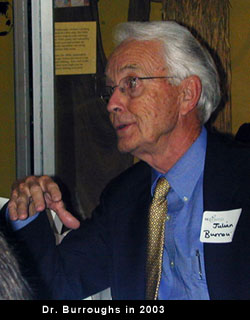 Burroughs himself was the surprise. He had told reunion organizers he would be out of town on the weekend of the event. But as his former classmates and students mingled in Studio A at WFDD shortly before dinner was to convene at the nearby Anthropology Museum, there were suddenly murmurs of his arrival.
Burroughs himself was the surprise. He had told reunion organizers he would be out of town on the weekend of the event. But as his former classmates and students mingled in Studio A at WFDD shortly before dinner was to convene at the nearby Anthropology Museum, there were suddenly murmurs of his arrival.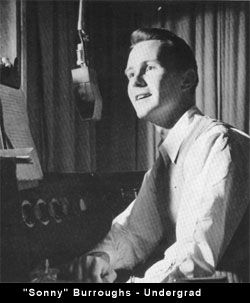 At the same time, he had a great interest in the theatre. When he realized he could not focus equally on both, he chose radio.
At the same time, he had a great interest in the theatre. When he realized he could not focus equally on both, he chose radio.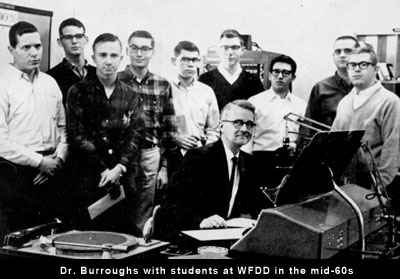
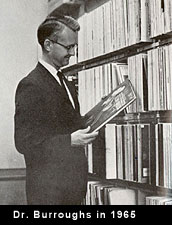 "When I was the Station Manager on the old campus, I asked the college to allow the station to be a part of the publications board so we could get funding." said Burroughs. "And it gave us added recognition - the Big Four: Old Gold and Black. The Howler. The Student. WFDD. When I came back to Wake Forest one of the first things I did was to get rid of that affiliation. It gave the radio station a degree of independence and it made possible for me to go on and do my thing with the station." That "thing" was to develop WFDD into an noncommercial educational FM radio station. Burroughs had worked at WUOM while at the University of Michigan and learned what a college radio station could be.
"When I was the Station Manager on the old campus, I asked the college to allow the station to be a part of the publications board so we could get funding." said Burroughs. "And it gave us added recognition - the Big Four: Old Gold and Black. The Howler. The Student. WFDD. When I came back to Wake Forest one of the first things I did was to get rid of that affiliation. It gave the radio station a degree of independence and it made possible for me to go on and do my thing with the station." That "thing" was to develop WFDD into an noncommercial educational FM radio station. Burroughs had worked at WUOM while at the University of Michigan and learned what a college radio station could be.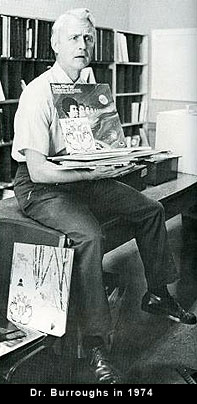 1967 was the year of the Public Broadcasting Act, which established the
1967 was the year of the Public Broadcasting Act, which established the 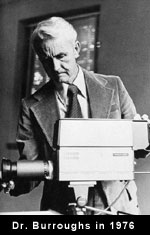 WFDD initiated its first fund drive in 1978. Being a full-time teacher with all that entailed, Burroughs did not have the time to raise money for the station, and this motivated him to leave the station in 1981.
WFDD initiated its first fund drive in 1978. Being a full-time teacher with all that entailed, Burroughs did not have the time to raise money for the station, and this motivated him to leave the station in 1981.